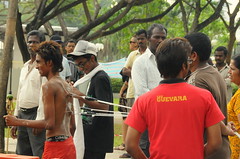Beef Tournedos, Thaipusam and James 3:13 - 4:12


Twas the night before Thaipusam, when all through the house
Beef tournedos were sizzling, and thankfully not the mouse
Japanese sweet potatoes and butter-cream were mashed up with care
Knowing that dinner for the hungry four would soon be there.
Beef tournedos were sizzling, and thankfully not the mouse
Japanese sweet potatoes and butter-cream were mashed up with care
Knowing that dinner for the hungry four would soon be there.
Bleagh. The perils of dodgy doggerel.
Though grain-fed Angus and therefore not macho enough for some macho men, the beef was fairly sweet and tasty. And besides, a far meatier passage from James' epistle (James 3:13 - 4:12) awaited:
James addresses the person who thinks he is "wise and understanding" (James 3:13). Sophos ("wise") was apparently the technical term amongst Jews for the teacher/scribe/rabbi. So perhaps James is going back to giving those aspiring to be teachers (James 3:1) a good shake. But like much biblical truth, what he is about to say applies to all men.
Wisdom and understanding, like faith (James 3:14-26) are inner qualities invisible to the naked eye. And like real faith which cannot merely be head knowledge but must issue in works, real wisdom inevitably demonstrates itself in the lives of those who claim to be wise (James 3:13). Real wisdom which comes from above (James 3:17) is meek (James 3:13) - gentleness born not of weakness or resignation but of deliberate choice, pure, peaceable, gentle, open to reason, full of mercy and good fruits, impartial and sincere (James 3:17). It produces peace and results in a harvest of righteousness (James 3:18). There are no quarrels and fights amongst parties who are truly wise and understanding.
False wisdom that is earthly, unspiritual and even, demonic (James 3:15) can easily be known by its rotten fruits. The bitter jealousy and selfish ambition in the hearts issues in boasting and falsehood (James 3:14), resulting in disorder and every vile practice (James 3:16), and quarrels and fights (James 4:1-2).
Cause of war amongst men stems from our hearts. People have spent whole lives looking everywhere else to discover the cause of war but like the punchline to Roald Dahl's Lamb to Slaughter, the answer was right under their noses. The ultimate cause of fighting isn't ignorance and barbarianism so that with a little education and clean clothing we will all be better people; it isn't the lack of watchdogs and safeguards and regulation by authorities; and it certainly isn't the older generation clinging on to their outdated outmoded forms of government or conservative ideals which we the younger generation can change, yes we can.
In the heart of every man, woman and child is the insatiable desire to get what we want to the detriment of other people. Or perhaps "detriment" is too mild a word. What we do, observes James is that we murder - that is the depth of the evil in our bitter hatred toward others (James 4:1-2).
We Christians are murderers. So great is the tyranny of sin that it even survives redemption.
Having gone down to Little India to have a look at the Thaipusam festivities and seen devout Hindus carrying spiked kavadis of up to 50kg, walking on nail shoes, having their tongues speared and cheeks speared, attaching hooks into their backs to pull heavy carts, we were reminded of the uniqueness of the Christian God. He is the God who does not require us to get his attention by feats of endurance. To be accurate, he is the God who is so holy that no feats of endurance or extreme self-inflicted pain can ever purify us enough to approach him. To solve this problem, he gave his only Son to die for us so that we sinners would be able to communicate with a holy God without perishing as we ought. So all we need to do is to pray to him and he will listen. We do not need to persuade a reluctant God who has better things to do with his time to hear us.
But we are so stupidly prone to navel-gazing that we don't even take advantage of this benefit for which God himself has paid so high a price to ask him for things that we want (James 4:2). And those of us who do get around to asking him for things abuse the privilege, asking God to be our servant to gratify our desires and join us in serving our sick lusts (James 4:3). It is a mercy from God that he does not give us what we ask for (James 4:3) and thus condemn us in our sin.
By nature we desire the things and riches of this world and not the things of God. When we are converted and start having a relationship with God, we desire what he desires but soon the sin in our hearts causes us to slip back and start desiring the things of the world again.
"The world" doesn't refer to that which God made that is good and that we are to enjoy, for the Bible does tell us how to enjoy life. "The world" actually refers to society that has forgotten God; it knows of him of course and, like the demons, might tremble at his awesomeness (James 2:19) but it does not worship him nor submit to him. This world is jealous when we give any time to God, gasping with concern that we are taking Christianity too seriously and that religion in moderation is the key to successful living.
When we become its friends, when we return to being enthusiastic about its hobbies and interests, get stung by its criticisms, and desire its favour and praise, we become enemies with God (James 4:4). It could be the world's ploy that Christians are bogged down with identifying specifics as evil and of the devil - pilates and yoga perhaps or rock and alcohol. But really, the evil is within us and our actions, however the world might falsely comfort us of their innocuousness, are its fruit. How do we tell we are worldly? By our use of time and money, and hopes for our children, and hopes for ourselves, and our conduct. What are our dreams? What do we value - money, comfort, friends, marriage, fame, a place in human history, saving the world?
Our relationship with God is unique also because never has man thought up a god that would treasure his relationship with us more than we ourselves care for it. In the Old Testament, the relationship between God and his people was described as that of a bridegroom and bride. God is not just a lover of his people but a jealous lover (James 4:5, Deuteronomy 32:16 and 32:21, Exodus 20:5 and 34:14, Zechariah 8:2). God loves men with such a passion that he cannot bear any other love within the hearts of men.
How then can we return to our first love? We can't ourselves, but as if the privilege of an intimate relationship were not enough, God gives us more grace (James 4:6). When we are sliding down the slippery road back to hell, God graciously brings us back to him again. Obviously we will need to humble ourselves - to know our place before God, to submit ourselves to him. No man is without a master - it is either God or the devil. If we do not submit to God, then our master is the devil and we never will be able to resist him, we will remain constantly under his tyrannical power. So bow the knee, acknowledge God's authority, surrender and be willing to obey (James 4:7). And start to fight against worldly desires again. There must not be any ceasefire negotiation with sin. We must draw near to God in prayer (James 4:8), and make ourselves single-minded for God. We are to clean our own hands and purify our own hearts (James 4:8). We must be in deadly earnest about it and stop that light-hearted gay attitude that dismisses sin easily. If we truly understood our status, we would start weeping over our own sin (James 4:9).
If we are repentant and humble ourselves before God and know our position before him, then surely we cannot speak evil against our brothers or judge them (James 4:11). For doing so would be acting contrary to the God and his laws (James 4:12) which we profess to love.
Apparently, katalalia ("speaking evil") does not mean quarrelling but rather speaking against another person, disparaging a person's character and motive, usually behind his back. It is the sin of those who meet in corners and gather in little groups and pass on confidential information which destroy the good name of those who are not there to defend themselves. It includes negative speculation about the motives of others. It can also mean speaking about someone to bring him down in his own eyes or those of others. And the things we say don't necessarily have to be completely untrue, for Satan himself specialises in half-truths. And truly, we are so sinful that we can even use complete truths destructively, sometimes heavily dusted with the Christian sugar-coating of love. We usually do this to build ourselves up, both the speaker and hearer feeling a glow of self-righteousness in the after.
By so doing, we exalting ourselves above God's law of love and dismissing it readily saying that our rule about wanting to talk about someone is better than that one.
The prohibition against judging our brother does not to rule out civil courts and judges, for we are told that God institutes authorities over societies; neither can it rule out discernment because we are told to weigh things up and to rebuke another if necessary. Instead, it seems to be the sort of judgement, possibly final verdict, that lift us up into God's place to judge another as our subject.
Don't we remember, we who call ourselves Christians, that if man's words are powerful, God's words which created the entire world and which do not return to him empty but accomplish what God pleases (Isaiah 55:11) are infinitely more powerful? Don't we remember what God really thinks of us rebellious sinners could have destroyed us with his words, but that with his Word he rescued us instead? Can we still speak about others mercilessly, perhaps not in manner but in content, and can we still collude in this sin by listening mercilessly as well?
Who are we, exactly, who think so little of the mercy of God, that we show so little mercy to others? Who are we who think our law of words is better than God's love of love? Who are we who think that we know that innermost motives of others that we presume to condemn them as judge?
Dick Lucas, James 4:1-10
Dick Lucas, James 4:11-12
Andy Gemmill, James 4-5
Cathy McKay's honest reflections about Worldliness in Disguise
James
- Muaythai Aftermath and Two Cents on Sickness and Sin, and Prayer in James 5
- Baking Bread and James 4:13-17
- Beef Tournedos, Thaipusam and James 3:13 - 4:12
- Stories, the Tongues That Tell Them and James 3:1-12
- Lunar New Year Lunacy with the Ox-y Morons, and Faith, Works and Justification in James 2:14-26
- Braised Short-Ribs of Dead Cow, Creamless Strawberry Pav, 44th POTUS' Inauguration and James 2:1-13
- Mirror Masks and True Religion and Worship in James 1:19-27
- A Feather Duster, Discipline and Happiness, Righteousness and Trials in James 1:2-4
Labels: *James, All Given For Food: Dead Cows












0 Comments:
Post a Comment
Subscribe to Post Comments [Atom]
<< Home